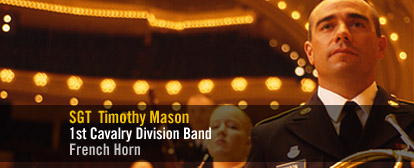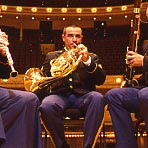
SGT TIMOTHY MASON

My name is Tim Mason, I'm a sergeant in the United States Army and I'm stationed at Fort Hood Texas in the 1st Cavalry Division. I'm a French horn player in the First Cav Band. We are divisional bands, so we serve the 1st Cavalry Division, which is about 17,000 Soldiers.
I love horn playing and the instrument itself has a long history. I love the sound, I love the literature of the horn, and as far as an instrument within an ensemble it's very, very versatile. We're right in the middle of a pack—we're sandwiched right between woodwinds and brass. Musically we can adapt pretty much any style within any ensemble. Horn players are kind of a unique breed, and I think I'm kind of unique, too.
Every band is going to be made up of the group as a whole for, let's say, concert band purposes or marching band, ceremonies, outdoor things; and then within the large group, depending on what is needed, you're going to find a wide range of small ensembles. For example, in our unit we have a woodwind quintet, two bass quintets, a tuba euphonia quartet, a show band—which in our band is sort of a just a rock, pop, Top 40, anything and everything that you might hear on the radio they're going to be able to play. Other bands may have everything from a Dixieland quartet to jazz trios, to jazz combos, stage bands, percussion ensembles—you're going to find a wide variety of things.
Prior to coming in the Army I taught high school band and middle school band. I was a teacher for eight years. After eight years of teaching—I enjoyed teaching and there's a lot of things about it that I still miss, but at the same time, you're not able to play as a teacher as much as you'd probably like to. Some band directors are satisfied with not playing as much and doing more teaching. I, on the other hand, missed getting down and playing. getting my chops back and playing more and more. I'd always thought if I could earn a stable living at playing my horn I'd like to do that—and that's not easy as a freelanced musician. You spend a lot of time going from paycheck to paycheck or job to job. As far as the practical things—salary and benefits and that sort of thing—the Army was able to provide that for me.
I amazed even myself in basic training, I really thought I was going to be falling behind. In a nutshell I thought it was going to be a whole lot harder than it was and what it ended up being was very difficult, very hard, but I found myself able to rise to the occasion—so to speak—and my impression was that I was going to be sort of behind the curve. I was going to be sort of following the pack, instead of leading the pack, because I came in considerably older than the average recruit.
I went to AIT at the U.S. Armed Forces School of Music. It's on the Little Creek Naval Amphibious Base in Norfolk, Virginia. Soldiers, Sailors and Marines are trained there. I wasn't quite sure what to expect, having been through college and been through a school of music twice before, so I approached it from a different perspective. I already had my chops as a student. I already knew how to discipline myself as far as practicing. Essentially, you are assigned a private instructor there. Your daily routine involves PT, taking music theory courses, sight singing, ear training, practicing and more practicing. It's very similar to a school of music with a little military twist on it. It was neat to see everything from students coming right out of high school all the way to people like myself that have had a lot more experience and everything in between.
As far as a career, the best thing about the Army bands is that it offers stability. It offers a good salary in terms of salary and benefits, compared with the civilian world. If you try to make it as a musician outside of teaching or outside of the military band venue, you're going to have a hard road to go. That's not to say that's not a good life, but it is highly competitive, it is very highly competitive—I can't stress that enough. So to try to make a living as a freelance musician in a highly competitive field, that's extremely hard, and not everybody can do that. The Army bands is a great way to provide for yourself, provide for your family, and still do what you love to do. I just think it's the best-kept secret.









 Enlisted
Enlisted




